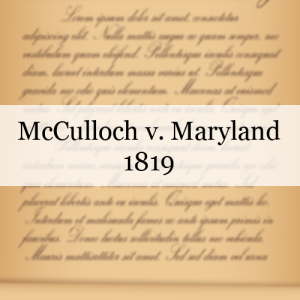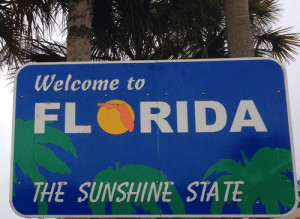Menu
Hot-Topics
May 17, 2022 | SCOTUS Wraps Up Oral Arguments for the Term
Category: Supreme Court Decisions

The Dred Scott Decision: Slavery and the U.S. Supreme Court
In March of 1857, the U.S. Supreme Court considered the constitutionality of the Missouri Compromise - a federal statute that regulated slavery in several western territories of the country - in the infamous Dred Scott Decision, 60 U.S. 393 (1857). ...

Separation of Powers Decides Jerusalem Passport Dispute
In Zivotofsky v. Kerry, the U.S. Supreme Court held that the power to recognize foreign states and governments is exclusive to the President. The 6-3 decision, which rested almost exclusively on the Constitution’s separation of powers, highlights t...

Gibbons v. Ogden: The Commerce Clause
In Gibbons v. Ogden, 22 U.S. 1 (1824), the U.S. Supreme Court first held that Congress has the authority to regulate any form of commerce that crosses state lines. The opinion, authored by Chief Justice John Marshall, is considered the most influenti...

McCulloch v. Maryland: The Necessary and Proper Clause
In McCulloch v. Maryland, the U.S. Supreme Court held that Congress has broad discretionary authority to implement the powers enumerated in the Constitution under the Necessary and Proper Clause. McCulloch v. Maryland, 17 U.S. 316 (1819) is reg...

Online Threats & The First Amendment in Elonis v. United States
While many were hoping that the U.S. Supreme Court would address whether existing precedent that excludes threatening speech from First Amendment protection applies to online speech, the justices elected to resolve Elonis v. United States on purely s...

San Francisco v. Sheehan: Law Enforcement and the Mentally Disabled
Amidst growing distrust of police officers, the U.S. Supreme Court recently addressed the use of force when attempting to subdue a mentally disabled person in San Francisco v. Sheehan The Court’s narrow decision held that two San Francisco police ...

Maryland’s Tax Scheme Violates the Commerce Clause in Comptroller v. Wynn
In a 5-4 decision, the U.S. Supreme Court recently held that the state of Maryland’s tax scheme is unconstitutional. Since it fails to recognize taxes paid in other states, the Court found that the state’s personal income tax system violates the...

United States v. Guest: Conspiracies and the Fourteenth Amendment
In United States v. Guest, 383 U.S. 745 (1966), the U.S. Supreme Court held that violations of the Fourteenth Amendment can serve as grounds for criminal charges under a federal conspiracy law that makes it a crime to "injure, oppress, threaten, or i...

Florida’s Campaign Finance Laws for Judicial Candidates Does Not Violate First Amendment
There are acceptable limits to free speech in some campaign finance laws for the Roberts Court, at least when it comes to judges elected by popular vote. In a case regarding campaign finance laws, Williams-Yulee v. The Florida Bar, the majority of t...
Previous Articles
SCOTUS Wraps Up Oral Arguments for the Term
by DONALD SCARINCI on May 17, 2022
The U.S. Supreme Court has concluded its oral arguments for the October 2021 Term. The justices hea...
SCOTUS Rules Censure of Elected Board Member Didn’t Violate First Amendment
by DONALD SCARINCI on May 10, 2022
In Houston Community College System v. Wilson, 595 U.S. ____ (2022), the U.S. Supreme Court held th...
Supreme Court Breach Is Not the First Involving Roe v. Wade
by DONALD SCARINCI on
The recent disclosure of Justice Samuel Alito’s decision purporting to overturn Roe v. Wade is ar...
The Amendments
-
Amendment1
- Establishment ClauseFree Exercise Clause
- Freedom of Speech
- Freedoms of Press
- Freedom of Assembly, and Petitition
-
Amendment2
- The Right to Bear Arms
-
Amendment4
- Unreasonable Searches and Seizures
-
Amendment5
- Due Process
- Eminent Domain
- Rights of Criminal Defendants
Preamble to the Bill of Rights
Congress of the United States begun and held at the City of New-York, on Wednesday the fourth of March, one thousand seven hundred and eighty nine.
THE Conventions of a number of the States, having at the time of their adopting the Constitution, expressed a desire, in order to prevent misconstruction or abuse of its powers, that further declaratory and restrictive clauses should be added: And as extending the ground of public confidence in the Government, will best ensure the beneficent ends of its institution.
Awards




